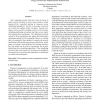Free Online Productivity Tools
i2Speak
i2Symbol
i2OCR
iTex2Img
iWeb2Print
iWeb2Shot
i2Type
iPdf2Split
iPdf2Merge
i2Bopomofo
i2Arabic
i2Style
i2Image
i2PDF
iLatex2Rtf
Sci2ools
106
click to vote
ICPP
2002
IEEE
2002
IEEE
Integrating Trust into Grid Resource Management Systems
Grid computing systems that have been the focus of much research activities in recent years provide a virtual framework for controlled sharing of resources across institutional boundaries. Security is one major concern in any system that enables remote execution. Several techniques can be used for providing security in Grid systems including sandboxing, encryption, and other access control and authentication mechanisms. The additional overhead caused by these mechanisms may negate the performance advantages gained by Grid computing. Hence, we contend that it is essential for the scheduler to consider the security implications while performing resource allocations. In this paper, we present a trust model for Grid systems and show how the model can be used to incorporate the security implications into scheduling algorithms. Three scheduling heuristics that can be used in a Grid system are modified to incorporate the trust notion and simulations are performed to evaluate the performance...
Grid | Grid Computing | Grid System | ICPP 2002 |
Related Content
| Added | 14 Jul 2010 |
| Updated | 14 Jul 2010 |
| Type | Conference |
| Year | 2002 |
| Where | ICPP |
| Authors | Farag Azzedin, Muthucumaru Maheswaran |
Comments (0)

